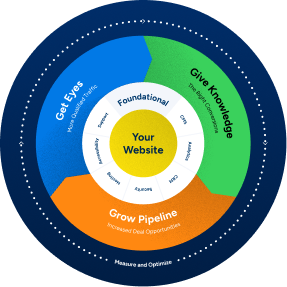Google has announced that 3rd party cookies will soon become a thing of the past. The search engine announced that it will be phasing out these cookies by 2023, and although that date has been changed to the end of 2024, you can still expect them to be something that’s no longer used in the future. This brings up the question of what B2B brands and cookies will look like in the future.
Cookies have been around so long that many can’t imagine marketing without them, but a future with no cookies isn’t really all that bad.
B2B brands may be wondering how marketing would be possible without the data gained from cookies and how to plan for strategies without them. This article will dive into what to expect from a cookieless world and whether or not it will be so terrible for marketing.
What Are Cookies?
We’ve become so used to cookies that it’s easy to forget what they are and what they do. Without getting too technical, a cookie is basically a packet of information about website users that gets stored.
This information allows websites to remember the users and their preferences. Some cookies are temporary, such as one-time login sessions, while others are permanent, such as passwords or purchase history.
There are two types of cookies; the 3rd party cookies and the 1st party cookies. The 3rd party cookies are created by external websites to collect information. For example, if you’re on a website and there is a product ad, the company selling the product could use information about you even if you weren’t near its website.
It is the 3rd party cookie that allows advertisers and marketers to track their target audience around the internet to learn more about what they like and what kind of content they click on.
1st party cookies consist of information gathered by the websites that you visit. The data they collect includes passwords, usernames, and so on.
The removal of 3rd party cookies may not be so bad after all, because 1st party cookies can still be used to gather data and provide website visitors with personalized experiences. Of course, this will take more careful planning and dedication, but marketers and advertisers won’t fall apart without 3rd party cookies.
What does this mean for B2B brands? That there isn’t that much to worry about and strategies based on not using 3rd party cookies can still be successful. Let’s look at some really good B2B marketing strategies that can work well in a cookieless world.
Unify Customer Data
When 3rd party cookies aren’t available, B2B brands can still unify customer data across marketing and sales. This will mean, though, that sales teams and marketing teams have to work together and share the independent information they have.
Each team will have a different piece of the target audience’s preferences and identity, and by putting it together, the user experience will improve. By making teams collaborate, more accurate information is available and the data can lead to better customer insights.
Prioritize Consent and Transparency
Simply taking customers and website visitors’ information without their consent is not something that will be tolerated anymore. It is for this reason that 3rd party cookies will become defunct in the future.
B2B brands will have to be upfront about the information they’re gathering and how they plan to use it. They must ask for consent, even if it’s likely that people are going to say no.
As a result, you’ll have to offer value in exchange for information. Clearly describing the benefits of data collection can encourage visitors to share their information. It might also be a good idea to offer exclusive content or access to services and products in return for data.
Be sure to authenticate prospects as soon as you can. The sooner you have info on who you’re talking to, the more personalized you can make their experience.
Create Personal Customer Journeys
Although B2B customers aren’t the same as B2C customers, there is still an expectation of having the same personal experience. That’s why B2B brands need to build tailored customer journeys that are complex and aimed at specific users.
Connected customer services improve the experience for your audience and this can lead to improved customer lifetime value and lowered acquisition costs. Product interest, industry information and persona-based data can help brands build unique customer journeys.
Build Better Relationships With Your Audience
The removal of 3rd party cookies will ask B2B brands to create deeper connections with their audiences and build better relationships. Since brands can’t rely on 3rd party cookies, they will have to focus on their side of the data collection.
There will be more reliance on voluntarily-provided customer data, so brands will have to improve their campaign relevance so users don’t opt out of providing information. Brands will be working harder to provide value to customers, which will improve relationships and engagement in the long run.
Create Awesome Content
The focus of content will go from the often-used and cheap strategy of clickbait to a focus on valuable content experiences. Direct digital engagement channels like social media and email marketing will become far more valuable, and more care is put into the planning of relevant strategies.
Instead of pushing annoying ads, B2B brands will have to provide value through education and informative, entertaining content. This will result in a high-value content experience for users, who will appreciate the brands more, leading to a win-win situation for everyone involved.
Invest in People-First Marketing
People want to trust brands, and brands want people to trust them. So why is brand trust not always easily built?
In many cases, 3rd party cookies are part of the problem. Customers don’t want their information gathered and used without their consent. When it is known that a brand uses 3rd party cookies, the trust between it and its audience is negatively affected.
B2B brands can still gather important information from customers. This is as long as there is honesty and the brand remembers that customers are people first and buyers second.
In a cookieless future, B2B digital marketing strategies should focus on providing customers with personalized touchpoints across channels to boost engagement, which will improve relationships and build trust.
Connect with GoingClear & Advance Your Digital Growth and Learn More on B2B Brands and Cookies!
Cookies will one day be a distant memory. B2B brands will use other ways to gain valuable information about their customers. It is possible to have ad efficiency and plan effective marketing strategies without cookies. This is as indicated by the suggested strategies in this article. It will just take some getting used to and better planning.
If you need a B2B marketing agency to help you develop successful strategies, you should consider working with GoingClear. The team behind this company consists of dedicated marketers, developers, strategists, and designers. We will be happy to help you come up with the perfect strategy for your business. Contact us today to find out more!
GoingClear Resources
Not ready to chat about a project just yet but still interested in gaining knowledge?

